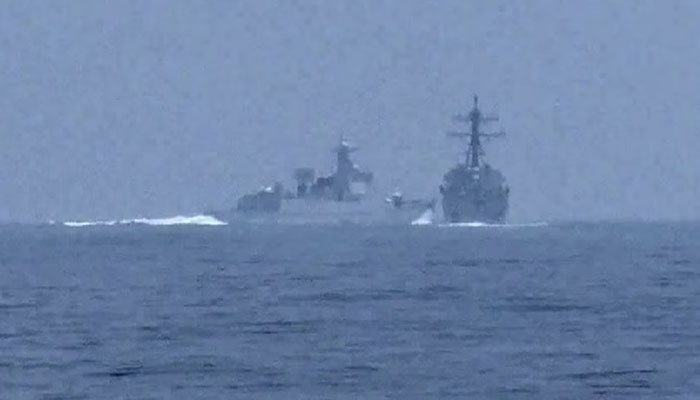[ad_1]

China’s Defense Minister, Li Shangfu, in a speech at the Shangri-La Dialogue security summit in Singapore, accused the United States and its allies of attempting to destabilize the Indo-Pacific region. These remarks came only hours after warships from both countries narrowly avoided a collision at sea.
Li alleged that the US was “provoking bloc confrontation for self-interest” and claimed that Washington and its allies were imposing their own rules to assert dominance over the region. He sternly warned that any severe confrontation between the US and China would result in “an unbearable disaster for the world.”
Li’s warning followed US Defense Secretary Lloyd Austin’s cautious remarks at the same forum, where he described a war over Taiwan as “devastating” and emphasized its potential to profoundly impact the global economy in unimaginable ways.
The near collision occurred when a Chinese warship allegedly cut in front of an American vessel participating in a joint exercise with the Canadian navy in the Taiwan Strait, forcing the US ship to decelerate to avoid a collision.
When questioned about the incident, Li condemned the US naval presence in the strait, accusing Washington of creating chaos in the region. He asserted that the US warships were not there for innocent passage but for provocation. Li emphasized that if the US and other foreign powers wished to avoid confrontation, they should refrain from sending their military assets near China. In a straightforward manner, he advised them to “mind their own business” and questioned why such incidents always seemed to occur in areas near China rather than in areas near other countries.
The incident, captured on video by Canada’s Global News crew aboard the frigate HMCS Montreal, drew criticism from Captain Paul Mountford, the commander of the Canadian vessel, who described the actions of the Chinese ship as “not professional.” A senior US defence official emphasized that actions speak louder than words and highlighted the dangerous behaviour exhibited by the People’s Liberation Army (PLA) in the Taiwan Strait, the South China Sea, and other regions.
In response to the incident, a spokesperson for the PLA’s Eastern Theater Command released a statement, asserting that Chinese forces had handled the situation in compliance with laws and regulations. The spokesperson accused relevant countries of deliberately stirring up trouble and risks in the Taiwan Strait, maliciously undermining regional peace and stability, and sending erroneous signals to “Taiwan independence” forces.
This recent near collision between US and Chinese destroyers marks the second instance of aggressive manoeuvres by Chinese military personnel near China’s borders in just two weeks. Previously, a Chinese fighter jet engaged in an unnecessarily aggressive manoeuvre during an intercept of a US spy plane in international airspace over the South China Sea.
Given these incidents, Secretary Austin called on Beijing to rein in the conduct of its forces and urged China to engage in meaningful dialogue. Taiwan also voiced its opinion, placing blame on Beijing for provocative behaviour in the strait and urging the Chinese Communist Party to respect freedom of navigation to uphold regional peace, stability, and safety.
The comments from the Chinese and US defence chiefs come at a time of heightened tension in bilateral relations, with China rejecting an offer from Secretary Austin to meet at the Singapore summit due to US sanctions on Chinese officials and companies.
While Austin and Li exchanged a cordial handshake at a banquet, Austin emphasized the need for more substantial discussions. However, it appears that there will be no meeting between the US and Chinese defence chiefs this year, underscoring the deep fracture in their relations.
In his address, Secretary Austin also raised concerns about China’s numerous risky intercepts of US and allied aircraft in international airspace, emphasizing the US commitment to supporting its allies and partners against coercion and bullying.
The ongoing lack of communication between the two nations raises the potential for an incident that could quickly spiral out of control, making dialogue and de-escalation critical for avoiding further confrontations.
[ad_2]
Source link
